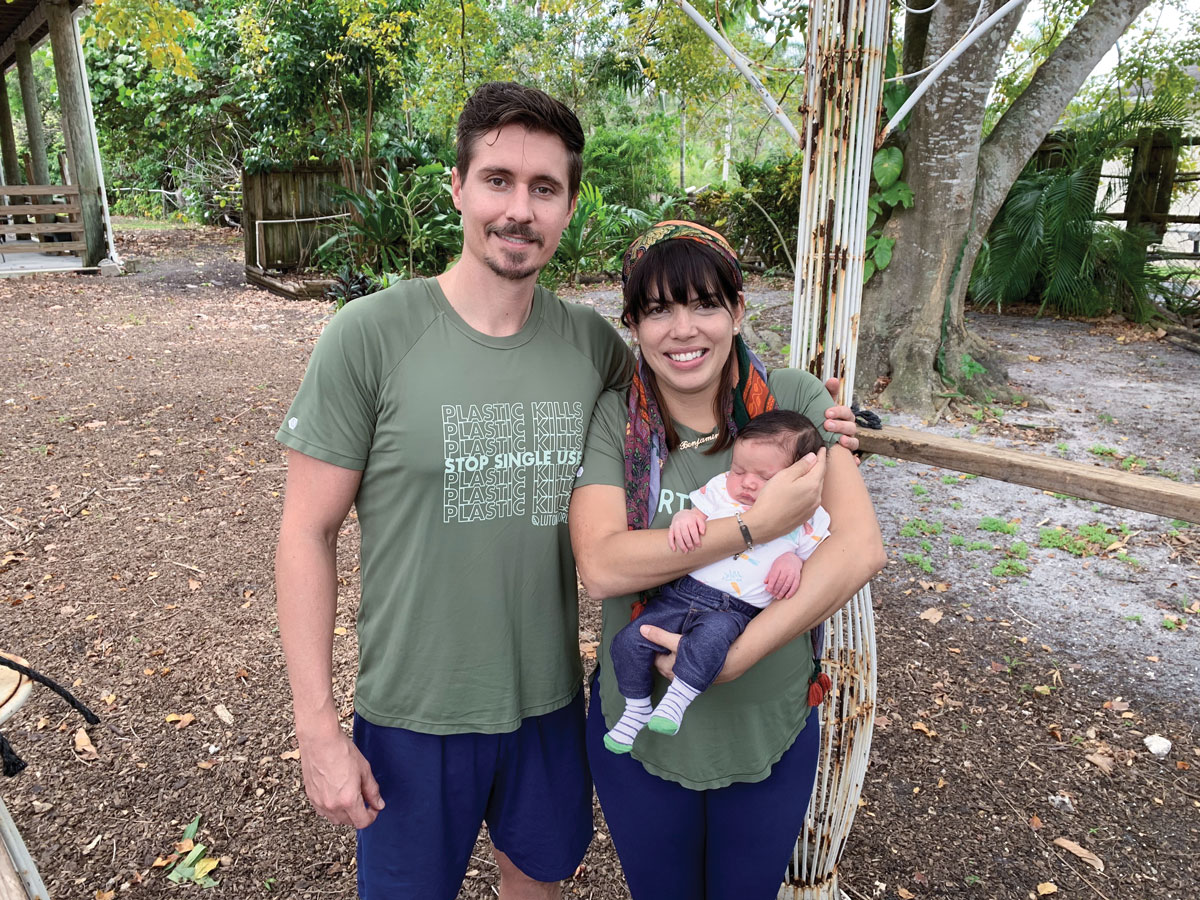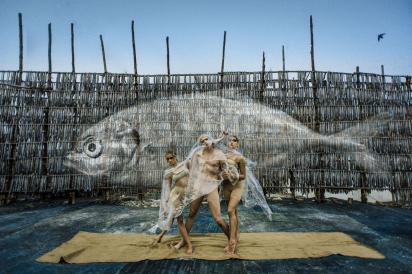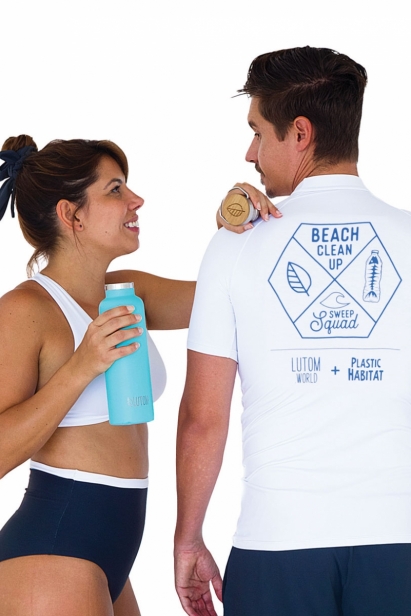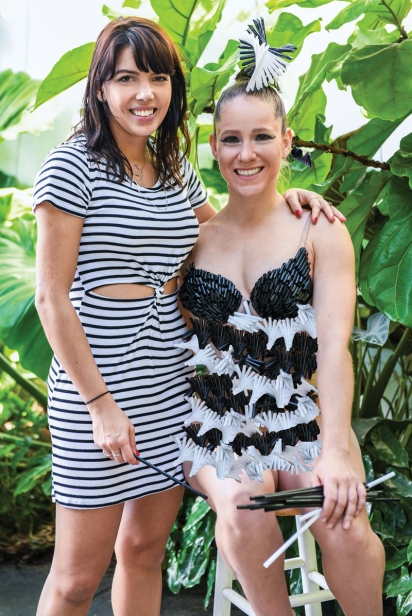Two Eco-Enthusiasts Want You to Rethink Your Habits
They met cute on Tinder, sharing a love for long walks on the beach, cleaning up trash along the way. He created art pieces from discarded items like bottle caps to bring awareness to plastic pollution. She found ways to reduce waste as a costume manager for a traveling circus.
Together, they found love and a mutual passion for making the planet cleaner by creating Lutom World, a retail business selling activewear made with biodegradable fabrics, bamboo toothbrushes, vacuum-insulated thermos bottles and other ethically made products that leave little impact on the earth.
Luana Ouverney Simonson, 34, grew up in Rio de Janeiro in a home that practiced sustainability. Her father, an industrial designer, exhibited his collapsible couch made from plastic soda bottles at a Milan furniture fair, a novel concept at the time. Luana earned her degree in fashion, traveled to the United States to improve her English and ended up working as an au pair for a family in a San Francisco suburb. “They were extremely eco-friendly,” she says. “They composted, ate veggies from their own garden, had a biodiesel car, shopped at local farmers markets and secondhand shops.” When Luana returned to Brazil, she found a job as a seamstress for the local staff at Cirque du Soleil, the Canadian circus that takes its shows around the globe. Eventually, she got a job as a touring wardrobe assistant.
Joining the Circus
“The audience sees the magic,” she says. But behind the scenes, organizing the costumes is a daunting task. Of the 18 40-ft containers each show required, four were dedicated to costumes – 4,500 pieces – plus washers and dryers. As a company, the Montreal-based Cirque du Soleil is committed to creative, sustainable practices throughout their business. The landscape surrounding the headquarters is a food garden that grows vegetables and herbs for employee meals. Because they use more than four miles of fabric every year to create stage outfits and sets, the company is constantly looking for new methods and materials to increase the lifespan of their costumes. Luana applied her own sensibility to her job, reusing zippers and buttons, recycling and donating goods to local charities and replacing disposable coat hangers and plastic covers with reusable versions.
While she was traveling around the world with her foldable bike in tow, Tom Simonson was working with his family’s deli business. Also 34, Tom, an artist and environmentalist, grew up in Davie and went to Broward College. He also enjoyed South Florida’s watersports. “Every time I’d go surfing, I brought along buckets to pick up trash at the beach,” he says. The marine debris he encountered inspired him to create Plastic Habitat, a movement to bring awareness to plastic pollution problems through art, beach and park cleanup events. “Anyone can start and spread the idea through social media,” he says. “Every visit to the beach or park can be a mini-cleanup.”
The two met via the dating app, Tinder, when she was in town with the circus, and went on a date. Tom impressed Luana with his art pieces and his hobby of collecting trash as she did. “I can’t believe I met this guy! He made me feel at home.” In between her tours, they managed to stay in touch and finally he decided to come to Brazil to meet the parents.
Search for Eco-friendly Products
“When you have a great job, it’s hard to know when to leave,” says Luana, but after years of travel, she decided she’d had enough. The couple came up with the idea of turning their passion for the planet into a business: Lutom World. Years of working with acrobats and nylon costumes gave her the background she needed into researching and finding a suitable fabric for their activewear – one that would completely biodegrade, unlike nylon – while his Plastic Habitat Etsy products synched up with their mission. They set up a website and tracked down like-minded retailers in South Florida to carry their line.
While the pandemic slowed down some of their business activity in 2020, the couple did find time to marry. Luana wrote the Eco-Savvy Traveler Guidebook. In it, she draws a parallel between the fashion industry today and the movement toward healthy organic food in the early 2000s. “The more people demand quality, eco-friendly and durable clothing, like they did for organic and healthy food, the more companies will be persuaded to produce these products. In turn, the more companies that produce them, the cheaper and more accessible these items will become,” she says.
Just before this story went to print, they welcomed their latest collaboration: little Benjamin – the most important reason of all to create a cleaner world.
Lutom World
Fast fashion may be cheap and cute, but disposability is a problem, according to Luana and Tom. Every year, 85% percent of all textiles end up in landfills, much of that activewear made with polyester that does not biodegrade. For their collection, they looked for a fabric that would completely break down. They found their answer in a product called Amni Soul Eco, a hypoallergenic, UV-protective, ultra-absorbent, sweat wicking, quick-drying and odor-resistant fabric that degrades without leaving behind harmful chemicals. Their apparel – t-shirts (they’re wearing them in their portrait on the previous page), shorts, tops and leggings for men and women – is made ethically by a family-owned business in Brazil. Other products they sell include bamboo toothbrushes, a canvas drawstring bag/tote with an upcycled pocket from Buddha Pants, and insulated thermos bottles.
Find their products online and at Wynwood Tribe Store; Pivot Market at The Citadel; Kcull Shop, Coconut Village, Coconut Grove and Little Havana.
Pledge for the Planet
The pandemic gave Luana time to finish her book, the Eco-Savvy Traveler Guidebook, drawn from her experiences traveling the globe with Cirque du Soleil. She invites readers to commit to living more sustainably through practical actions. Here’s a partial list:
I will:
[ ] Carry reusable bags for shopping
[ ] Purchase a reusable water bottle
[ ] Drink from a reusable cup
[ ] Carry reusable cutlery
[ ] Stop using plastic straws
[ ] Compost food scraps
[ ] Avoid buying fruits and vegetables wrapped in plastic and do my best to select the most sustainable packaging
[ ] Not use Styrofoam containers when buying eggs and other products
[ ] Avoid buying single-use plastic bottles
[ ] Choose metal cans over plastic and always recycle the cans
[ ] Pack food in reusable containers when I bring food to the beach, park or elsewhere
[ ] Recycle everything I cannot reuse in appropriate bins
[ ] Volunteer at beach cleanups
[ ] Support plastic and Styrofoam bans
[ ] Use reef-safe sunscreen
[ ] Support local small businesses and buy ethically made products







